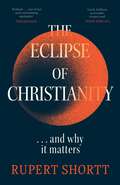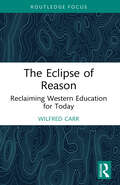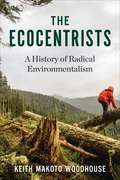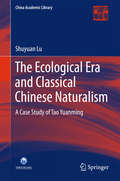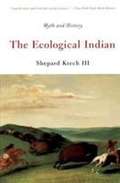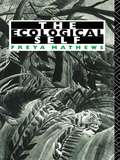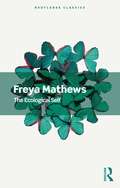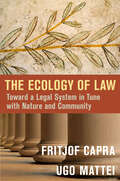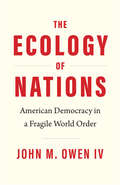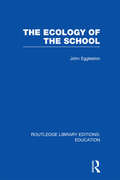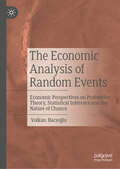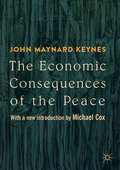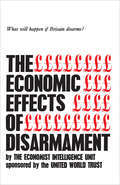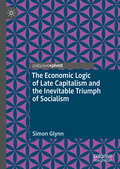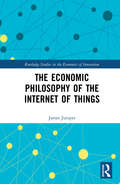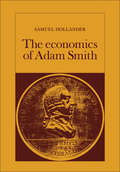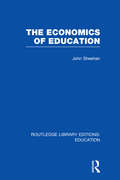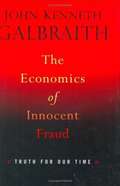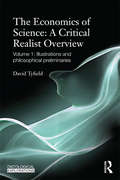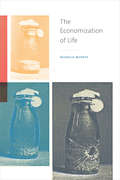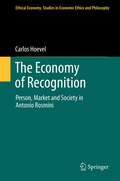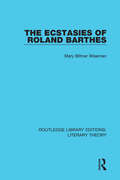- Table View
- List View
The Eclipse of Christianity: and why it matters
by Rupert ShorttA call for Christianity to recover its confidenceThe mainstream Churches are faltering - or even at risk of dying out - in their Western and Middle Eastern heartlands. Surveys confirm that only a minority of people in a country such as Britain now claim Christian allegiance. The pattern is being matched in neighbouring societies. At the same time many opinion formers preach secularist ideology with a self-confidence shading into dogmatism. Others, unsure of their moorings, feel some residual attachment to spirituality, while being sceptical about the existence of God and other articles of belief.Yet church teaching remains intellectually robust, as well as inspiring a transformative global presence. In this major and wide-ranging international study - both a report on the unsettling consequences of secularisation and a defence of a creed too often belittled by its opponents - Rupert Shortt outlines Christianity's fading profile in the present, but also argues compellingly that Europe's historic faith remains critical to the survival of a humane culture.
The Eclipse of Christianity: and why it matters
by Rupert ShorttA call for Christianity to recover its confidenceThe mainstream Churches are faltering - or even at risk of dying out - in their Western and Middle Eastern heartlands. Surveys confirm that only a minority of people in a country such as Britain now claim Christian allegiance. The pattern is being matched in neighbouring societies. At the same time many opinion formers preach secularist ideology with a self-confidence shading into dogmatism. Others, unsure of their moorings, feel some residual attachment to spirituality, while being sceptical about the existence of God and other articles of belief.Yet church teaching remains intellectually robust, as well as inspiring a transformative global presence. In this major and wide-ranging international study - both a report on the unsettling consequences of secularisation and a defence of a creed too often belittled by its opponents - Rupert Shortt outlines Christianity's fading profile in the present, but also argues compellingly that Europe's historic faith remains critical to the survival of a humane culture.
The Eclipse of Reason: Reclaiming Western Education for Today (Routledge Research in Education)
by Wilfred CarrThis concise, digestible book shows how the cultivation of reason became the defining aim of western education, and critiques how this aim has been eclipsed in recent decades by the neoliberal system of mass schooling imposed by the state.Chapters outline succinctly the history of western education and its origins in Ancient Greece, demonstrating how the idea of education as intrinsically related to the development of reason became embedded in the Western educational tradition, and how this tradition subsequently developed and evolved. Introducing key philosophical ideas about the nature of education, the book shows how the development of mass schooling in the 19th century led to our current educational landscape, where neoliberal demands for schools to be more responsive to market forces have obscured the development of reason as a distinctive educational aim. By inviting educators to think reflectively and critically about the state of education today, the book raises the little-discussed educational question of what comes after neoliberalism.Calling for the re-establishment of western education’s core values and aims, this book will be of interest to educators, researchers and students involved with pre- and in-service teacher education courses, as well as those interested in the history of education and the philosophy of education more broadly.
The Ecocentrists: A History of Radical Environmentalism
by Keith Makoto WoodhouseDisenchanted with the mainstream environmental movement, a new, more radical kind of environmental activist emerged in the 1980s. Radical environmentalists used direct action, from blockades and tree-sits to industrial sabotage, to save a wild nature that they believed to be in a state of crisis. Questioning the premises of liberal humanism, they subscribed to an ecocentric philosophy that attributed as much value to nature as to people. Although critics dismissed them as marginal, radicals posed a vital question that mainstream groups too often ignored: Is environmentalism a matter of common sense or a fundamental critique of the modern world?In The Ecocentrists, Keith Makoto Woodhouse offers a nuanced history of radical environmental thought and action in the late-twentieth-century United States. Focusing especially on the group Earth First!, Woodhouse explores how radical environmentalism responded to both postwar affluence and a growing sense of physical limits. While radicals challenged the material and philosophical basis of industrial civilization, they glossed over the ways economic inequality and social difference defined people’s different relationships to the nonhuman world. Woodhouse discusses how such views increasingly set Earth First! at odds with movements focused on social justice and examines the implications of ecocentrism’s sweeping critique of human society for the future of environmental protection. A groundbreaking intellectual history of environmental politics in the United States, The Ecocentrists is a timely study that considers humanism and individualism in an environmental age and makes a case for skepticism and doubt in environmental thought.
The Ecological Era and Classical Chinese Naturalism: A Case Study of Tao Yuanming (China Academic Library)
by Shuyuan LuReflecting the currently growing eco-movement, this book presents to western readers Tao Yuanming, an ancient Chinese poet, as a representative of classical oriental natural philosophy who offered lived experience of “dwelling poetically on earth.” Drawing on Derrida’s specter theory, it interprets Tao Yuanming in a postmodern and eco-critical context, while also exploring his naturalist “kindred spirits” in other countries, so as to urge the people of today to contemplate their own existence and pursuits. The book’s “panoramic” table of contents offers readers a wonderful reading experience.
The Ecological Indian: Myth and History
by Shepard KrechThe idea of the Native American living in perfect harmony with nature is one of the most cherished contemporary myths. But how truthful is this larger-than-life image? According to anthropologist Shepard Krech, the first humans in North America demonstrated all of the intelligence, self-interest, flexibility, and ability to make mistakes of human beings anywhere. As Nicholas Lemann put it in , "Krech is more than just a conventional-wisdom overturner; he has a serious larger point to make. . . . Concepts like ecology, waste, preservation, and even the natural (as distinct from human) world are entirely anachronistic when applied to Indians in the days before the European settlement of North America. " "Offers a more complex portrait of Native American peoples, one that rejects mythologies, even those that both European and Native Americans might wish to embrace. "--
The Ecological Self
by Freya MatthewsThis is the first book-length treatment of the metaphysical foundations of ecological ethics. The author seeks to provide a metaphysical illumination of the fundamental ecological intuitions that we are in some sense `one with' nature and that everything is connected with everything else. Drawing on contemporary cosmology, systems theory and the history of philosophy, Freya Mathews elaborates a new metaphysics of `interconnectedness'. She offers an inspiring vision of the spiritual implications of ecology, which leads to a deepening of our conception of conservation.
The Ecological Self (Routledge Classics)
by Freya MathewsEnvironmental disasters, from wildfires and vanishing species to flooding and drought, have increased dramatically in recent years and debates about the environment are rarely far from the headlines. There is growing awareness that these disasters are connected – indeed, that in the fabric of nature everything is interconnected. However, until the publication of Freya Mathews' The Ecological Self, there had been remarkably few attempts to provide a conceptual foundation for such interconnectedness that brought together philosophy and science. In this acclaimed book, Mathews skilfully weaves together a thought-provoking metaphysics of the environment. She connects the ideas of the seventeenth-century philosopher Spinoza with twentieth-century systems theory and Einstein’s physics to argue that the atomistic cosmology inherited from Newton gave credence to a picture of the universe as fragmented, rather than as whole. Furthermore, it is such faulty thinking that presents human beings as similarly disconnected and individualistic, with the dire consequence that they regard nature as of purely instrumental rather than intrinsic value. She concludes by arguing for an ethics of ecological interdependence and for a basic egalitarianism among living species. A compelling and fascinating account of how we must change our thinking about the environment, The Ecological Self is a classic of ecological and environmental thinking. This Routledge Classics edition includes a substantial new Introduction by the author.
The Ecology of Law: Toward a Legal System in Tune with Nature and Community
by Fritjof Capra Ugo MatteiWINNER OF THE 2015 IBPA BENJAMIN FRANKLIN AWARD IN POLITICS/CURRENT EVENTSThe Ecology of Law Fritjof Capra and Ugo Mattei argue that at the root of many of the environmental, economic, and social crises we face today is a legal system based on an obsolete worldview. Capra, a bestselling author, physicist, and systems theorist, and Mattei, a distinguished legal scholar, explain how, by incorporating concepts from modern science, the law can become an integral part of bringing about a better world, rather than facilitating its destruction. This is the first book to trace the fascinating parallel history of law and science from antiquity to modern times, showing how the two disciplines have always influenced each other—until recently. In the past few decades, science has shifted from seeing the natural world as a kind of cosmic machine best understood by analyzing each cog and sprocket to a systems perspective that views the world as a vast network of fluid communities and studies their dynamic interactions. The concept of ecology exemplifies this approach. But law is stuck in the old mechanistic paradigm: the world is simply a collection of discrete parts, and ownership of these parts is an individual right, protected by the state. Capra and Mattei show that this has led to overconsumption, pollution, and a general disregard on the part of the powerful for the common good. Capra and Mattei outline the basic concepts and structures of a legal order consistent with the ecological principles that sustain life on this planet. This is a profound and visionary reconceptualization of the very foundations of the Western legal system, a kind of Copernican revolution in the law, with profound implications for the future of our planet.
The Ecology of Nations: American Democracy in a Fragile World Order (Politics and Culture)
by John M. OwenHow democracies compete with autocracies to bias international order in their favor—and why democracies are losing It is well known, and much discussed, that liberal democracy is in trouble worldwide. Much of this discussion focuses on conditions within individual countries: their inequalities of wealth, political polarization, media environments, and dominant ideologies. In this book, John M. Owen IV sees the failures of democracy as failures of “ecosystem engineering.” Like beavers, nesting ants, or (most intensely of all) humans, nations actively reshape their environments to make them more favorable for their own species—this, for Owen, is the true meaning of Woodrow Wilson’s phrase “to make the world safe for democracy.” However, liberalism has evolved in ways that are no longer conducive to its own survival; meanwhile, autocratic governments in Russia and China are actively reshaping the international environment to favor autocracy. Owen argues that the way to ensure democracy’s survival in the United States is to reimagine liberalism—to view it as less about disruption and perpetual openness and more about commitment, community, and country. Liberalism must reject the “great delusion” that it can defeat autocracies everywhere and convert them into liberal democracies, yet also counter moves by China and Russia to make the world safe for autocracy.
The Ecology of the School (Routledge Library Editions: Education)
by John EgglestonWithin a single educational system – that of England and Wales – the nature of schooling available to a child can be dramatically different. Even between residential areas the differences in educational climate can be striking. Apart from differences in the organization of schools and the availability of buildings, teachers and resources, there are also significant ideological variations between local education authorities. This book considers the evidence of such differences, some of the environmental factors (political, social and economic) that may account for their distribution, and the consequences that appear to spring from them.
The Economic Analysis of Random Events: Economic Perspectives on Probability Theory, Statistical Inference and the Nature of Chance
by Volkan HacıoğluThis book investigates applications of probability theory to random events from an economic standpoint and considers how economics can deal with uncertainty in today’s world. As such the nature of chance and probability will be discussed with examples taken from the theoretical literature in probability and the history of economic thought, as well as real-life events.Chapters cover the nature of randomness and the element of chance, the concepts of both hidden costs and opportunity costs, the economic effect of human action, the randomness of economic events, random walk hypotheses and observable and unobservable phenomena. It situates the discussion in John Maynard Keynes’ and Ronald Fisher’s seminal works on probability, as well as introducing key tenets of probability theory and how these can be applied to economic events. The book considers the relationship between artificial intelligence and economic events, the role of big data, and international examples fromdifferent economic systems and how these can be evaluated. It also introduces a multidisciplinary exploration of other social sciences and how they deal with uncertainty, to assess the extent to which it is possible to apply probability theory to economic events which are by nature erratic and uncertain.This book will be of interest to researchers and students in economics, statistics, and those in the social sciences interested in questions of randomness and chance.
The Economic Consequences of the Peace: With a new introduction by Michael Cox (The\best Sellers Of 1920 Ser.)
by John Maynard KeynesFirst published in December 1919, this global bestseller attacking those who had made the peace in Paris after the First World War, sparked immediate controversy. It also made John Maynard Keynes famous overnight and soon came to define how people around the world viewed the Versailles Peace Treaty. In Germany the book, which argued against reparations, was greeted with enthusiasm; in France with dismay; and in the US as ammunition that could be (and was) used against Woodrow Wilson in his ultimately unsuccessful bid to sell the League of Nations to an increasingly sceptical American public. Meanwhile in his own country the book provoked outrage amongst establishment critics – Keynes was even refused membership of the prestigious British Academy – while admirers from Winston Churchill to the founders of the LSE, Sidney and Beatrice Webb, went on to praise Keynes for his wisdom and humanity. Keynes may have written what he thought was a reasoned critique of the economics of the peace settlement. In effect, he had penned a political bombshell whose key arguments are still being debated today. The Economic Consequences of the Peace is now reissued by Keynes’ publisher of choice with a new introduction from Michael Cox, one of the major figures in the field of International Relations today. Scholarly yet engaged and readable, Cox’s introduction to the work – written a century after the book first hit the headlines – critically appraises Keynes' polemic contextualising and bringing to life the text for a new generation of scholars and students of IR, IPE, Politics and History. The original text and this authoritative introduction provide essential reading for anyone who wishes to understand the tragedy that was the twentieth century; why making peace with former enemies can be just as hard as winning a war against them; and how and why ideas really do matter.
The Economic Effects of Disarmament: What will happen if Britain disarms?
by The Economist Intelligence UnitThis study, sponsored by the United World Trust, is the most detailed work to have been published on the results of disarmament on the British economy. It examines the consequences of the withdrawal of defence expenditures on industry and employment, and suggests how defence spending could be replaced in order to create new civil demand. The book provides precise and objective statistical analysis, which is much needed in this field. Both method and conclusions will be of interest in all countries to those concerned with public policy and the future of mankind.
The Economic Logic of Late Capitalism and the Inevitable Triumph of Socialism
by Simon GlynnBeginning with the economic meltdown of 2007/8, this book shows that the predatory mortgage lending and overleveraging—which is to say, the overextension of credit—which precipitated The Great Recession was a response to a crisis of overproduction reflective of an unavoidable contradiction at the heart of competitive capitalism. This contradiction, in addition to portending capitalism’s inevitable ultimate demise, invites both a pragmatic and moral comparison of (US) capitalism with (Chinese) socialism. Simon V. Glynn provides a critique of political economy and an analysis of the economic logic of capitalism, pointing to the inevitable triumph of socialism.
The Economic Philosophy of the Internet of Things (Routledge Studies in the Economics of Innovation)
by James JuniperTo properly understand the nature of the digital economy we need to investigate the phenomenon of a "ubiquitous computing system" (UCS). As defined by Robin Milner, this notion implies the following characteristics: (i) it will continually make decisions hitherto made by us; (ii) it will be vast, maybe 100 times today’s systems; (iii) it must continually adapt, on-line, to new requirements; and, (iv) individual UCSs will interact with one another. This book argues that neoclassical approaches to modelling economic behaviour based on optimal control by "representative-agents" are ill-suited to a world typified by concurrency, decentralized control, and interaction. To this end, it argues for the development of new, process-based approaches to analysis, modelling, and simulation. The book provides the context—both philosophical and mathematical—for the construction and application of new, rigorous, and meaningful analytical tools. In terms of social theory, it adopts a Post-Cognitivist approach, the elements of which include the nature philosophy of Schelling, Marx’s critique of political economy, Peircean Pragmatism, Whitehead’s process philosophy, and Merleau-Ponty’s phenomenology of the flesh, along with cognitive scientific notions of embodied cognition and neural Darwinism, as well as more questionable notions of artificial intelligence that are encompassed by the rubric of "perception-and-action-without-intelligence".
The Economics of Adam Smith
by Samuel HollanderThe renewed interest in the works of the great classical economists reflects in part a recognition that there is still much to be learned from them about the operation of the economy. This volume is the first in a series of four in which Professor Hollander will provide an analytical and critical assessment of the thought of the British school of classical economists; later volumes will elucidate the thought of Ricardo and Malthus, Mill, and Marx. This study relates Smith's theoretical position to contemporary history and economic practice. It pays particular attention to Smith's vision of the process of industrialization during the mid-eighteenth century, his approach to British colonial policies, and his view of the desirability of economic development. Coming in time for the bicentennial celebrations of The Wealth of Nations, this work should interest all economists with a sense of the evolution and purpose of their discipline, and should commend itself as a detailed and careful reinterpretation of what Adam Smith was thinking about. One authoritative reader has called it: 'one of the most distinguished essays in the history of economic thought of the last quarter century.' (Studies in Classical Political Economy)
The Economics of Centralism and Local Autonomy
by Phillip J. BrysonA comparative analysis of the process of public sector transition from central planning to market democracy. It is the story of the difficulties and complexities of moving to a system of greater autonomy for the subnational governments of the Czech and Slovak Republics, including the future of fiscal policies after the global recession.
The Economics of Education (Routledge Library Editions: Education)
by John SheehanThis book is a survey of the principal aspects of the economics of education, such as the demand for education as consumption and as an investment, good education and economic growth, education and manpower needs, and the finance of education. In some cases in recent years, economic theory has been applied to educational problems in order to gain an insight into the workings of the educational system. The result has been a certain amount of confusion and distrust among teachers and educationists: confusion because some theoretical aspects are not easily understood and distrust of the economist’s intrusion into educational policy-making. This book overcomes these problems by making minimal demands on prior knowledge of economics and by emphasizing the limitations of economic analysis applied to policy matters.
The Economics of Innocent Fraud: Truth for Our Time
by John Kenneth GalbraithThe primary aspect of the "fraud" of the American economy that Galbraith (emeritus, economics, Harvard U.) criticizes is the false pretense of shareholder control over corporations, when in fact all real power has shifted to corporate managers. Contradicting conventional wisdom, or "approved belief" in his words, he denies the distinction between the private and public sectors, describing how the managerial class has unprecedented power in the economy's public sector, including major influence over important policies of war or peace. In the end, the continuing references to an impersonal market are "a not wholly innocent fraud."
The Economics of Science: Volume 1: Illustrations and Philosophical Preliminaries
by David TyfieldDramatic and controversial changes in the funding of science over the past two decades, towards its increasing commercialization, have stimulated a huge literature trying to set out an "economics of science". Whether broadly in favour or against these changes, the vast majority of these frameworks employ ahistorical analyses that cannot conceptualise, let alone address, the questions of "why have these changes occurred?" and "why now?" Nor, therefore, can they offer much insight into the crucial question of future trends. Given the growing importance of science and innovation in an age of both a globalizing knowledge-based economy (itself in crisis) and enormous challenges that demand scientific and technological responses, these are significant gaps in our understanding of important contemporary social processes. This book argues that the fundamental underlying problem in all cases is the ontological shallowness of these theories, which can only be remedied by attention to ontological presuppositions. Conversely, a critical realist approach affords the integration of a realist political economy into the analysis of the economics of science that does afford explicit attention to these crucial questions; a ‘cultural political economy of research and innovation’ (CPERI). Accordingly, the book sets out an introduction to the existing literature on the economics of science together with novel discussion of the field from a critical realist perspective. In arguing thus across levels of abstraction, however, the book also explores how concerted engagement with substantive social enquiry and theoretical debate develops and strengthens critical realism as a philosophical project, rather than simply ‘applying’ it. Divided into two volumes, in this first volume the book explores the ‘top’ and ‘tail’ of the argument, regarding substantive and philosophical aspects. Starting with substantive illustrations, we explore the social challenges associated with the contemporary commercialization of science and the movement towards a knowledge-based bio-economy. Having shown the explanatory benefits of assuming a realist political economy perspective, the book then turns to the task of reconstructing and justifying that theoretical perspective. True to the overall argument regarding attention to ontological presuppositions, this starts with critical realism’s critique of mainstream economics but also develops critical realism itself towards what may be called a ‘transcendental constructivism’.
The Economization of Life
by Michelle MurphyWhat is a life worth? In the wake of eugenics, new quantitative racist practices that valued life for the sake of economic futures flourished. In The Economization of Life, Michelle Murphy provocatively describes the twentieth-century rise of infrastructures of calculation and experiment aimed at governing population for the sake of national economy, pinpointing the spread of a potent biopolitical logic: some must not be born so that others might live more prosperously. Resituating the history of postcolonial neoliberal technique in expert circuits between the United States and Bangladesh, Murphy traces the methods and imaginaries through which family planning calculated lives not worth living, lives not worth saving, and lives not worth being born. The resulting archive of thick data transmuted into financialized “Invest in a Girl” campaigns that reframed survival as a question of human capital. The book challenges readers to reject the economy as our collective container and to refuse population as a term of reproductive justice.
The Economy of Recognition
by Carlos HoevelIntroducing an alternative philosophical foundation to the study of economics, this book explains and adopts the perspective of the Italian philosopher Antonio Rosmini (1797-1855), whose interpretation of economic action was fundamentally at odds with the prevailing and all-conquering utilitarianism of modernity. Rosmini, one of the most important Italian and Catholic philosophers of the modern age, eschewed the traditional concepts of subjectivism and individualism at the core of the utilitarian thesis, prefiguring today's critique of 'autistic economics' with his assertion that micro-economic formulae consecrating the 'maximization of utility' derive not from scientific principles or even hypotheses, but from uncritically adopted philosophical ideas. It was an assault on the determinism he perceived as the fatal flaw in accepted economic theory. Rosmini's notion of human and economic action, based on human beings' 'personal' capacities for objective knowledge, truth recognition, moral goodness and happiness, deeply transform the meaning of central economic activities such as labour, wealth creation and consumption, and become crucial factors in any analysis of the operation of the economy. After introducing the fundamentals of Rosmini's thought, the author details the theoretical and institutional features of utilitarian economics, tracing their influence on social norms. He juxtaposes these with Rosmini's alternative philosophy which places the concept of social justice at its heart, and which attempts to establish a framework for relations between the public and private realms. The contemporary case is then made for adopting Rosmini's principles, thus changing an economic paradigm widely held to be unassailable. The fruit of unprecedented and systematic research on Rosmini's economic ideas, this volume offers a detailed conceptual framework to guide alternative approaches to conventional neoclassical economics.
The Ecstasies of Roland Barthes (Routledge Library Editions: Literary Theory #26)
by Mary Bittner WisemanIn this book, first published in 1989, Mary Bittner Wiseman interprets Roland Barthes’s experiments as efforts to reposition the human subject with respect to language and to time in order to let the subject escape from the language of a particular culture and the present time. With her insistent pushing against the boundaries of our standard academic assumptions, Mary Bittner Wiseman succeeds in interpreting Barthes’s effort to join the traditional and the new. This title will be of interest to students of literature and philosophy.
The Ecstasies of Roland Barthes (Routledge Library Editions: Literary Theory)
by Mary Bittner WisemanIn this book, first published in 1989, Mary Bittner Wiseman interprets Roland Barthes’s experiments as efforts to reposition the human subject with respect to language and to time in order to let the subject escape from the language of a particular culture and the present time. With her insistent pushing against the boundaries of our standard academic assumptions, Mary Bittner Wiseman succeeds in interpreting Barthes’s effort to join the traditional and the new. This title will be of interest to students of literature and philosophy.
